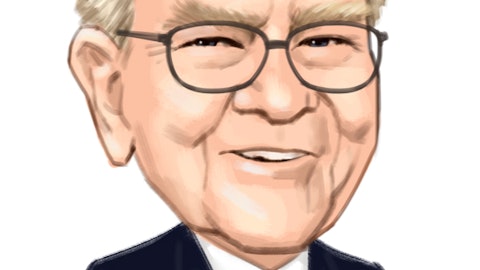In this article, we will be taking a look at the 13 safest stocks to invest in. To skip our detailed analysis of changing stock market dynamics today, you can go directly to see the 5 Safest Stocks To Invest In.
Since the beginning of the economic downturn sparked by the COVID-19 pandemic, investors have grappled with the predominant issue of inflation. While heightened prices may boost businesses’ revenue, they also compel cost-cutting measures, inducing financial constraints. Concurrently, a responsible central bank must promptly address inflation to prevent it from becoming a persistent feature of the economy. This involves the necessity to increase interest rates, a double-edged sword that can present additional challenges for both businesses and consumers.
In mid-November, stocks experienced a surge as an inflation report sparked optimism that the Federal Reserve’s efforts to curb inflation might have reached their limits. The S&P 500 saw a 1.9% increase on November 14, while the Russell 2000 index, which tracks smaller companies more sensitive to economic fluctuations, rose approximately 5%. These stock gains were driven by the anticipation that the Fed might not need to further raise interest rates, following new data indicating a slowdown in consumer price inflation for October. The central bank has been incrementally increasing borrowing costs since March of the previous year to moderate economic activity and mitigate the pace of price hikes. In addition, indications from reports on jobless claims, durable goods, and consumer sentiment suggest that the economy may be showing signs of easing but could remain strong enough to avoid a recession. Furthermore, the number of new applications for unemployment benefits in the U.S. decreased more than anticipated last week.
See also: Retirement Stock Portfolio: 10 Low Risk Investments
That being said, committed long-term investors pay little attention to the turbulent short-term fluctuations in stock markets. Instead of getting caught up in the uncertainties of rapid changes, they choose to invest in shares of reliable companies known for their consistent performance, evaluated over extended periods, often spanning years or even decades. While the idea of investing in entirely risk-free stocks may be tempting to many, the reality is that there is no stock that can guarantee 100% safety. Even the most reputable companies can face unforeseen challenges, and significant fluctuations in stock prices are not uncommon, even for the most resilient corporations. We saw this during the early stages of the COVID-19 pandemic when several robust companies experienced steep declines in their stock values, and that same trend continued well within 2023. However, it’s worth noting that certain stocks, including household names like Costco Wholesale Corporation (NASDAQ:COST), Walmart Inc. (NYSE:WMT), and Berkshire Hathaway Inc. (NYSE:BRK-B), are notably more secure than others.

A corporate finance professional studying a financial performance chart.
Our Methodology
For our list of the 13 safest stocks to invest in, we used a stock screener to come up with a list of stocks with a beta value of less than 1. These stocks belong to defensive sectors like consumer staples, healthcare, and energy. Many of these companies have solid dividend histories and enjoy a stable market position. Following that, we scanned Insider Monkey’s database of more than 910 hedge funds and picked 13 stocks that have a favorable hedge fund sentiment.
13. Dollar Tree, Inc. (NASDAQ:DLTR)
Number of Hedge Fund Holders: 38
Beta Value: 0.78
Dollar Tree, Inc. (NASDAQ:DLTR) is a retail chain in the United States offering a variety of products at multiple price points. The company is based in Chesapeake, Virginia, and boasts a network of 15,115 stores spread across the 48 contiguous U.S. states and Canada. Leveraging a widespread logistics network comprising 24 distribution centers, Dollar Tree, Inc. (NASDAQ:DLTR) primarily caters to price-conscious customers. In Q2 2023, the company’s consolidated net sales, encompassing the revenue from its three primary stores – Dollar Tree, Family Dollar, and Enterprise, witnessed a robust increase of 8.2%, reaching $7.32 billion.
According to Insider Monkey’s third quarter database, 38 hedge funds were bullish on Dollar Tree, Inc. (NASDAQ:DLTR), compared to 37 funds in the earlier quarter. Paul Hilal’s Mantle Ridge LP is the biggest position holder in the company, with 11.36 million shares worth $1.2 billion.
Much like Costco Wholesale Corporation (NASDAQ:COST), Walmart Inc. (NYSE:WMT), and Berkshire Hathaway Inc. (NYSE:BRK-B), Dollar Tree, Inc. (NASDAQ:DLTR) has consistently proven to be a safe stock to invest in.
Madison Mid Cap Fund made the following comment about Dollar Tree, Inc. (NASDAQ:DLTR) in its Q3 2023 investor letter:
“The bottom five detractors for the quarter were Dollar Tree, Inc. (NASDAQ:DLTR), MKS Instruments, CarMax, Floor & Décor, and Liberty Media- Formula One. The new management team at Dollar Tree is investing heavily to drive growth. While we are beginning to see some early signs of progress, including strong positive consumer traffic to their stores in the third quarter, these investments, combined with a challenging retail environment, are negatively impacting margins in the short run.
We added to Dollar Tree following the stock’s weakness in the quarter. Investors are concerned over weaker than expected margins, primarily caused by a mix shift to consumable products (versus higher margin discretionary products) and high theft (or inventory ‘shrink’). These dynamics have also been experienced by Dollar Tree’s closest peer, Dollar General, and broadly across the retail landscape. While certainly not favorable in the short term, we view these as natural cyclical aspects of the retail industry that won’t be sustained forever. However, more important to the long-term earnings power of the business, we are encouraged by some of the early results from the various initiatives management has in place. Namely, customer traffic has meaningfully increased at both the Dollar Tree and Family Dollar banners, driving solid market share gains and increased sales per square foot, which we believe to be one of the most important metrics to track the company’s progress. With these promising early results, we used the cloud of cyclical headwinds to opportunistically add to our position.”
12. General Mills, Inc. (NYSE:GIS)
Number of Hedge Fund Holders: 39
Beta Value: 0.24
General Mills, Inc. (NYSE:GIS) is a prominent American multinational company known for its production and marketing of branded processed consumer foods, widely available through retail channels. The company’s origins trace back to its establishment near Saint Anthony Falls in Minneapolis, along the Mississippi River, where it initially gained prominence as a significant flour milling operation.
On September 21, RBC Capital revised its price target for General Mills, Inc. (NYSE:GIS), lowering it from $78 to $76 while maintaining a Sector Perform rating on the stock. In their research note, the firm characterized the company’s Q1 results as relatively straightforward, with challenges in the Pet segment offset by strong performance in the Foodservice and International sectors. Additionally, the firm upholds its expectations for General Mills, Inc. (NYSE:GIS), anticipating organic net sales growth of 3% and EPS growth of 4% for FY24.
As of the end of Q3 2023, 39 hedge fund investors had allocated their investments to General Mills, Inc. (NYSE:GIS), as indicated by the Insider Monkey database. The largest shareholder of General Mills, Inc. (NYSE:GIS) was Millennium Management, with a holding of approximately 1.6 million shares valued at about $102.8 million.
11. Colgate-Palmolive Company (NYSE:CL)
Number of Hedge Fund Holders: 52
Beta Value: 0.43
Colgate-Palmolive Company (NYSE:CL) is a multinational corporation headquartered in Midtown Manhattan, New York City, on Park Avenue. The company primarily focuses on the manufacturing, distribution, and provision of a diverse range of household, healthcare, personal care, and veterinary products.
On September 14, the company announced a quarterly dividend of $0.48 per share, maintaining consistency with its previous dividend. Notably, Colgate-Palmolive has increased its dividends for an impressive streak of 61 consecutive years. As of November 20, the stock’s dividend yield stood at 2.51%.
According to the Insider Monkey database for the third quarter of 2023, out of 910 profiled hedge funds, 52 had a stake in Colgate-Palmolive Company (NYSE:CL). The largest stockholder was First Eagle Investment Management, which held 11 million shares of Colgate-Palmolive Company (NYSE:CL) with a combined value of $783.12 million.
10. The Coca-Cola Company (NYSE:KO)
Number of Hedge Fund Holders: 57
Beta Value: 0.58
Established in 1892, The Coca-Cola Company (NYSE:KO) stands as a renowned multinational American corporation, widely acknowledged for its production of the iconic beverage, Coca-Cola. Beyond its flagship product, the company is actively involved in the manufacturing, distribution, and promotion of an extensive range of non-alcoholic beverage concentrates, syrups, and notably, alcoholic beverages within the beverage industry.
In the first half of FY23, the company demonstrated robust financial performance, generating $4.6 billion in operating cash flow, with free cash flow reaching $4 billion for the same period. This underscores The Coca-Cola Company (NYSE:KO)’s strong cash generation ability, positioning it favorably to fulfill its shareholder commitments in the upcoming periods. As of November 20, the company pays a quarterly dividend of $0.46 per share, resulting in a robust yield of 3.18%.
With an impressive track record of consistent dividend increases spanning six decades and a business model resilient to economic downturns, The Coca-Cola Company (NYSE:KO) has garnered increased attention from both individual and institutional investors. As of the conclusion of the third quarter, among the 910 funds tracked by Insider Monkey, 57 hedge funds held positions in the company. Notably, the most significant investor was Warren Buffett, who maintained a substantial stake valued at $22.39 billion in The Coca-Cola Company (NYSE:KO).
9. CVS Health Corporation (NYSE:CVS)
Number of Hedge Fund Holders: 64
Beta Value: 0.53
Headquartered in the U.S., CVS Health Corporation (NYSE:CVS) is a prominent healthcare organization overseeing an extensive network of retail pharmacies and clinics across the nation. The company manages various brands, including CVS Pharmacy (a retail pharmacy chain), CVS Caremark (a pharmacy benefits manager), and Aetna (a health insurance provider).
In its third-quarter financial report, CVS Corporation (NYSE:CVS) surpassed Wall Street’s expectations, reporting adjusted earnings and revenue that were boosted in part by the strong performance in the health services sector. The quarter witnessed CVS Corporation (NYSE:CVS) achieving sales of $89.76 billion, indicating a nearly 11% increase from the corresponding period in the previous year. The company disclosed a net income of $2.27 billion, or $1.75 per share, for the third quarter. This marked a significant turnaround from the net loss of $3.40 billion, or $2.59 per share, reported for the same period a year ago. Excluding specific items such as amortization of intangible assets and capital losses, the adjusted earnings per share for the quarter stood at $2.21.
As of the conclusion of the third quarter in 2023, data from Insider Monkey’s database, monitoring 910 hedge funds, indicated that 64 hedge funds had positions in CVS Health Corporation (NYSE:CVS). Notably, Two Sigma Advisors, led by John Overdeck and David Siegel, emerged as a significant investor with a substantial stake in the company valued at $344.87 million.
Coho Partners Relative Value Equity Fund made the following comment about CVS Health Corporation (NYSE:CVS) in its second quarter 2023 investor letter:
“In December of 2017, CVS Health Corporation (NYSE:CVS) agreed to buy Aetna, which broadened its offering by entering the managed care business. CVS has been moving its portfolio to a more value-based outcome model, and Aetna was a major move in that direction. We were willing to accept the leverage that came with the deal because CVS has a very cash generative model, and we anticipated the free cash flow would enable the company to de-lever fairly quickly.
By mid-2022, CVS was in a position to use the free cash flow that had been going to debt repayment to do bolt-on deals to further prepare for the value-based outcome model and/or return more cash to shareholders in the form of higher dividends or share repurchases. However, CVS lost a “star” in its largest Medicare plan in late 2022 and this will adversely impact earnings in 2024. This was a surprise and disappointment to us, but management should be able to regain the “star” in the back half of 2023, which will then give the company a nice tailwind in 2025…” (Click here to read the full text)
8. PepsiCo, Inc. (NASDAQ:PEP)
Number of Hedge Fund Holders: 65
Beta Value: 0.56
PepsiCo, Inc. (NASDAQ:PEP), headquartered in the hamlet of Purchase within Harrison, New York, stands as a prominent American multinational corporation in the food, snack, and beverage industry. Renowned for its financial stability, the beverage giant maintains an ongoing streak of dividend growth spanning 51 years. Presently, it distributes a quarterly dividend of $1.265 per share, resulting in a dividend yield of 3.02% as of November 20.
According to Insider Monkey’s data, PepsiCo, Inc. (NASDAQ:PEP) was featured in 65 hedge fund portfolios by the conclusion of Q3 2023. Among the leading shareholders was Fundsmith LLP, holding 6.63 million shares of the New York-based beverage manufacturer, valued at $1.12 billion. Over the past five years, the company’s shares have witnessed a significant surge of approximately 45.2%.
7. Costco Wholesale Corporation (NASDAQ:COST)
Number of Hedge Fund Holders: 65
Beta Value: 0.77
Costco Wholesale Corporation (NASDAQ:COST) operates a global chain of membership warehouses, primarily under the name “Costco Wholesale,” offering high-quality, brand-name merchandise at significantly lower prices than conventional wholesale or retail sources. The company provides a quarterly per-share dividend of $1.02, resulting in a dividend yield of 0.70% as of November 20. Costco Wholesale Corporation (NASDAQ:COST) has consistently increased its dividends for the past 19 years, showcasing its dedication to rewarding shareholders.
According to Insider Monkey’s data, 65 hedge funds were long on Costco Wholesale Corporation (NASDAQ:COST) at the end of Q3 2023, compared to 67 funds in the previous quarter. Bridgewater Associates, led by Ray Dalio, is one of the most prominent stakeholders in the company, holding 828,184 shares valued at more than $467.8 million.
RiverPark Advisors mentioned Costco Wholesale Corporation (NASDAQ:COST) in its Q2 2023 investor letter. Here is what the firm has to say:
“Costco Wholesale Corporation (NASDAQ:COST), founded in 1983, is the world’s third-largest retailer with 850 stores, $240 billion in revenue and 68 million members spread across North America, Europe, Asia, and the Southern Pacific Region. The company is known for its strong value proposition driven by high-quality low-cost offerings including a well-regarded private-label brand. Costco regularly ranks at the top of customer surveys related to brand trust, product price and quality, and all-around experience. Historically, 90% of the company’s shoppers renew their memberships, which generate more than 50% of operating income.
Through expanding market share, new store openings, increasing member productivity, and omnichannel expansion, we believe the company can grow revenues annually in the high single digit percentage range. This revenue growth should yield steadily growing margins and EPS growth in the low-to-mid-teens, which should drive shareholder returns in the same range.”
6. The Procter & Gamble Company (NYSE:PG)
Number of Hedge Fund Holders: 75
Beta Value: 0.44
The Procter & Gamble Company (NYSE:PG), a global consumer goods corporation headquartered in Cincinnati, Ohio, was founded in 1837 by William Procter and James Gamble. The company is widely recognized for its diverse range of branded consumer packaged goods, distributed globally across segments such as Beauty, Grooming, Health Care, Fabric & Home Care, and Baby, Feminine & Family Care.
Currently, The Procter & Gamble Company (NYSE:PG) provides a quarterly dividend of $0.9407 per share, yielding 2.52% as of November 20. The company has consistently increased dividends for 67 consecutive years, solidifying its position not only as a leading dividend aristocrat stock but also as one of the safest stocks to invest in.
According to Insider Monkey’s second-quarter database, 75 hedge funds displayed a bullish position on The Procter & Gamble Company (NYSE:PG), representing a slight increase from the 74 funds in the previous quarter.
In addition to Costco Wholesale Corporation (NASDAQ:COST), Walmart Inc. (NYSE:WMT), and Berkshire Hathaway Inc. (NYSE:BRK-B), The Procter & Gamble Company (NYSE:PG) ranks as one of the safest stocks to invest in.
Click to continue reading and see the 5 Safest Stocks To Invest In.
Suggested articles:
- 30 Most Technologically Advanced Countries Heading into 2024
- Billionaire Steven Cohen’s Top High Dividend Stock Picks
- 12 Stocks Billionaire Stan Druckenmiller Just Bought and Sold
Disclosure. None. 13 Safest Stocks To Invest In is originally published on Insider Monkey.





